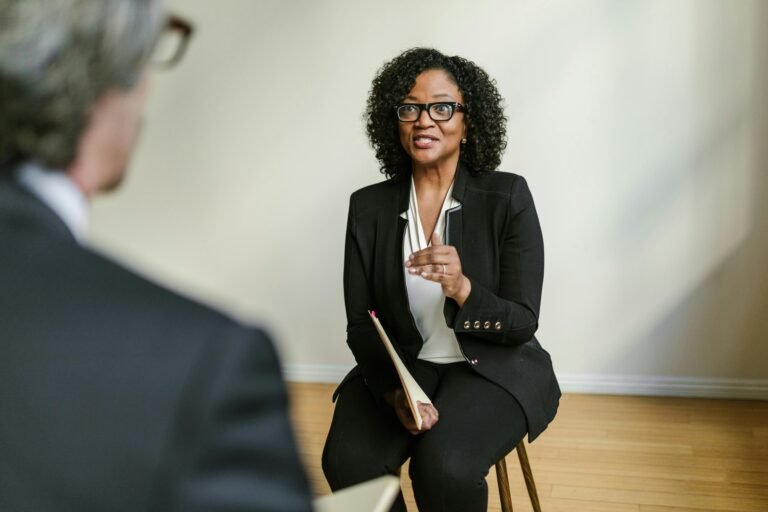Job interviews can be nerve-wracking, and let’s be honest—sometimes they can throw you curveballs. You’ve spent a lot of time prepping for all of the questions you may expect, but then, out of nowhere, the interviewer or committee asks something that you have no idea how to answer. It’s frustrating, right? But guess what? It’s completely normal to not have all the answers and that’s ok.
What matters most is how you handle those tricky interview moments. How you respond can reveal a lot about your ability to think on your feet, stay calm under pressure, and showcase your problem-solving skills—even when you don’t have the perfect answer ready. In this article, we’ll go over some 5 tips to help you tackle those tough interview questions you don’t know the answer to and provide examples of how you might approach these questions.
Tips for Answering Interview Questions You Don’t Know the Answer To
Stay Calm and Keep Your Cool
First things first—don’t panic! It’s easy to get flustered when you don’t know the answer to a question, but the key here is to stay calm. Take a deep breath, maybe flash a quick smile, and give yourself a moment to think. Appearing composed will make you come across as more confident, even if you’re feeling uncertain inside. Remember, you’re there to show your potential, and how you handle the pressure is often more important than having all the answers.
Be Honest, But Don’t Shut Down
It’s perfectly fine to admit you don’t know something—being honest shows integrity. But here’s the trick: don’t just leave it at “I don’t know.” Instead, show the interviewer how you think and problem-solve. Offer a thoughtful response or share how you would go about finding the answer. Interviewers are looking for candidates who are resourceful and can learn, not just those who have all the answers right off the bat.
For example:
“That’s a great question, and I haven’t encountered that specific scenario before. However, based on my experience with [similar situation], I’d approach it by [insert logical steps]. If needed, I’d also seek out additional resources to ensure I could make the best decision.”
Ask for Clarification
If the question feels vague or you need more details to give a precise answer, don’t be afraid to ask for clarification. It shows you’re genuinely interested in providing the best response possible, and it also gives you the chance to understand exactly what the interviewer is looking for. You can even ask for an example to make the question clearer. This shows that you’re thoughtful and focused on delivering an accurate, well-informed answer.
For example:
“Could you clarify what you mean by [term or phrase]? I want to make sure I fully understand the context before answering.”
Use What You Do Know
Sometimes, you might not be able to directly answer the question, but that doesn’t mean you’re stuck. Think about how you can relate the question to something you do know. Tap into your experience and logic to approach the problem. If you can’t provide a solution right off the bat, share how you’d go about solving the issue if you had more information or walk through a similar situation where you found a solution. Your ability to think critically will leave a lasting impression.
For example:
“I haven’t worked with that specific software yet, but I’m quite familiar with similar tools, like [insert name]. If I were tasked with learning it, I would first familiarize myself with the user manual and then reach out to my colleagues or online forums for tips. I’m comfortable with self-learning and know I could quickly adapt.”
Stay Positive and Keep the Conversation Flowing
It’s easy to fall into the trap of over-apologizing or dwelling on the fact that you don’t know something. Resist the urge to say, “Sorry, I just don’t know!” too many times. Doing so can make you seem unsure of yourself. Instead, keep a positive attitude and focus on what you can offer. Thank the interviewer for the question, express enthusiasm about learning new things, and smoothly transition into another part of the conversation. This approach will show that you’re flexible, open to growth, and able to maintain your composure even when the unexpected happens.
For example:
“I don’t have experience with that exact situation, but I’m always eager to learn. Here’s how I would approach it, [insert steps you would take]. Let me know if that makes sense or if you would like for me to expand further!”
In Closing
Job interviews are your chance to shine, not just because of what you know, but also because of how you handle the unknown. It’s perfectly normal to encounter questions that leave you stumped, but it’s all about how you handle those moments that matter. By staying calm, being honest, and demonstrating a positive, solution-oriented mindset, you’ll show the interviewer(s) that you’re not just someone who memorizes answers—you’re someone who can adapt, think critically, and grow in any environment.
So, next time you’re faced with a tricky question, remember: you’ve got this. Stay calm and collected, show your curiosity, and embrace the opportunity to learn. Good luck on your interview and with your job search!
Related Posts
What to Say and What Not to Say About a Previous Employer
How to Conduct a Self-Assessment to Identify Your Strengths and Weaknesses
Why You Should Never Criticize a Former Employer During a Job Interview
How to Use the STAR Method to Answer Interview Questions









